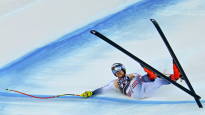The fierce outdoor races have been the talk of the town this week at the Alpine Skiing Championships held in Wengen, Switzerland. On Thursday, in the men’s skydiving competition Marco Kohler lost balance and overturned from a speed of almost 140 kilometers per hour.
On Friday, the French star in the men’s super mouth slalom race Alexis Pinturault fell ominously. On Saturday, Norway, one of the top names in the sport, had the most serious situation in diving Aleksander Aamodt Kilden under. He drifted out just before the finish and flew towards the safety fences.
Kohler’s and Pinturault’s racing season is probably over. Pinturault, who became a father just a week ago, shared an update on Saturday, according to which his condition is good considering the conditions. She shared a touching photo with her firstborn.
– The best painkiller. Thank you all for the kind words, Pinturault wrote in X.
Kilde, on the other hand, was operated on in a hospital in Bern. According to the doctor of the national team, the athlete’s calf was cut and his shoulder is dislocated. However, the duration of the competition break is still unclear.
Some of the athletes have criticized the really tight competition program. The men competed in speed events three times in a row, which is exceptional.
– I hope this is the last time ever when there are three races in a row, the biggest star of the men at the moment Marco Odermatt would say during Viaplay’s broadcast.
Manager Claus Rythe feels that alpine skiing has gone too far with frequent competitions.
– We don’t want injuries. We do everything we can to avoid them, he stated for NRK.
Bad combination
Urheilu’s alpine skiing expert Marcus Sandell is on the same lines. He does not feel that the length of Wengen’s diving course or the different features of the course would have created an actual moment of danger.
On the other hand, the fatigue caused by the speed races of the previous days and the length of the course are not an ideal combination.
– The program has completely changed because so many races had to be canceled in the early season. They have been jammed into the existing race weekends. Let’s go to the slopes every day to give it our all. Then there is the longest plunge of all, with high speeds, which culminates in these accidents.
Kilde, who fell on Saturday, had a cold this week. In Thursday’s race, he finished third, but he was still recovering from the race.
– In the case of Kilde, the greatest probability of her running out of strength was that she was in pain. It is clear that the flu is felt in the body. That program is just too heavy, says Sandell.
Also a Norwegian Viaplay expert Nina Haver-Löseth sees the cancellation of the Games causing an additional burden.
– Even a normal program causes enough stress, he reminded, according to NRK.
“Risk to the last”
So Vyyhti started from the Alpine Games, which were canceled due to poor weather conditions. For example, the men’s first speed race of the season was held just before Christmas.
According to Sandell, one option is not to look for replacement places for the canceled games. However, it causes inequality between species.
– The numbers of species would not be the same. There would be more technique races than speed races, which of course affects the overall cup. So there is a kind of politics behind it.
There are cancellations every year. Sandell says the FIS should think about reserve games.
– Instead of, for example, double races being held in Wengen, there could be an extra race somewhere in the beginning of the season.
Elian Lehto on Saturday the best of his career instead of his World Cup. He was in his 20s.
Lehto reminds us that speed sports always have their own risks.
– Those are things that belong to this genre. Of those, the top guys want to win, so they risk the very last one. Of course that’s dangerous as hell. We’re going really hard, we’re really fired up, two minutes down and tight turns.
– It’s the kind of thing that everyone accepts at the point when we go to the start. If we start removing elements that have been in this sport for the last 80 years, it’s not the same sport anymore, Lehto adds.
